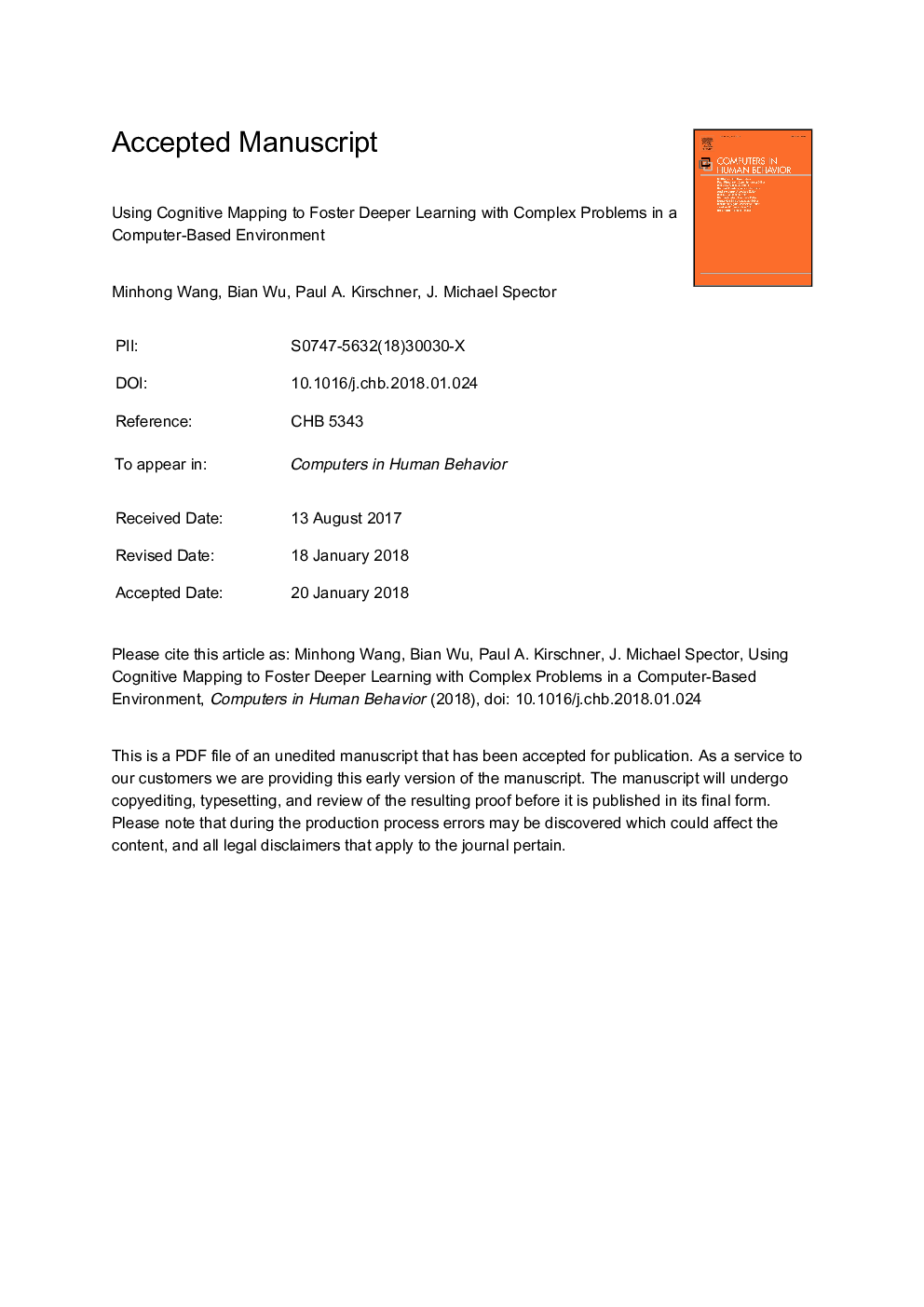| کد مقاله | کد نشریه | سال انتشار | مقاله انگلیسی | نسخه تمام متن |
|---|---|---|---|---|
| 6835797 | 1434604 | 2018 | 35 صفحه PDF | دانلود رایگان |
عنوان انگلیسی مقاله ISI
Using cognitive mapping to foster deeper learning with complex problems in a computer-based environment
ترجمه فارسی عنوان
با استفاده از نقشه برداری شناختی برای آموزش عمیق تر با مشکلات پیچیده در محیط کامپیوتری
دانلود مقاله + سفارش ترجمه
دانلود مقاله ISI انگلیسی
رایگان برای ایرانیان
کلمات کلیدی
حل مسئله، نقشه برداری شناختی، نقشه مفهومی، تجسم، داربست، محیط یادگیری مبتنی بر کامپیوتر،
ترجمه چکیده
نقشه مفهومی به طور گسترده ای مورد استفاده قرار گرفته است تا یادگیری معنی دار را تقویت کند و ارتباطات ایده های پیچیده را پشتیبانی کند. با تمرکز بر روی درک مفهومی، نقشه برداری مفهومی سنتی در پشتیبانی از حل مسئله به ویژه در شناسایی و نمایندگی از فرآیند پیچیده اعمال دانش به عمل، ناکافی است. در این مطالعه، یک رویکرد شناختی-نقشه برداری مبتنی بر کامپیوتر برای گسترش مفهوم نقشه برداری سنتی با اجازه دادن به یادگیرندگان برای نشان دادن فرایند حل مسئله و دانش اساسی در قالب بصری مورد استفاده قرار گرفت. با ارائه ایده ها به صورت شفاهی و تصویری، رویکرد شناختی نقشه برداری دارای پتانسیل بالایی برای ترویج تفکر و بازتاب موثر در زمینه های حل مسئله است. این مطالعه اثر روش شناختی-نقشه برداری مبتنی بر رایانه را با مقایسه آن با رویکرد یادداشت برداری که ایده ها را فقط در متن کلامی ارائه می دهد، مورد بررسی قرار داد. چهل و نه دانشجوی سالمند سالمندان در این مطالعه شرکت کردند. گروه تجربی از رویکرد شناختی-نقشه برداری استفاده کرد، در حالی که گروه کنترل با استفاده از رویکرد یادداشت برداری، تفکر پیچیده ای را در هنگام کار با مشکلات شبیه سازی تشخیصی بالینی در یک محیط یادگیری مبتنی بر کامپیوتر، تفسیر کرد. نتایج نشان می دهد اثرات محرک رویکرد شناختی-نقشه برداری بر بهبود عملکرد حل مسئله دانش آموزان، دانش موضوعی و انگیزه ذاتی برای یادگیری با مشکلات پیچیده است.
موضوعات مرتبط
مهندسی و علوم پایه
مهندسی کامپیوتر
نرم افزارهای علوم کامپیوتر
چکیده انگلیسی
Concept mapping has been widely used to foster meaningful learning and support the communication of complex ideas. With a focus on conceptual understanding, traditional concept mapping is found to be inadequate in supporting problem solving particularly in eliciting and representing the complex process of applying knowledge to practice. In this study, a computer-based cognitive-mapping approach was used to extend traditional concept mapping by allowing learners to represent the problem-solving process and the underlying knowledge in a visual format. By representing ideas both verbally and pictorially, the cognitive mapping approach has a high potential to foster effective thinking and reflection in problem-solving contexts. This study examined the effects of the computer-based cognitive-mapping approach by comparing it to a note-taking approach that represents ideas in verbal text only. Forty-nine senior year medical students participated in the study. The experimental group used the cognitive-mapping approach, while the control group used a note-taking approach, to articulate complex thinking and actions when working with simulated clinical diagnostic problems in a computer-based learning environment. The results show the promising effects of the cognitive-mapping approach on improving students' problem-solving performance, subject-matter knowledge, and intrinsic motivation to learn with complex problems.
ناشر
Database: Elsevier - ScienceDirect (ساینس دایرکت)
Journal: Computers in Human Behavior - Volume 87, October 2018, Pages 450-458
Journal: Computers in Human Behavior - Volume 87, October 2018, Pages 450-458
نویسندگان
Minhong Wang, Bian Wu, Paul A. Kirschner, J. Michael Spector,
